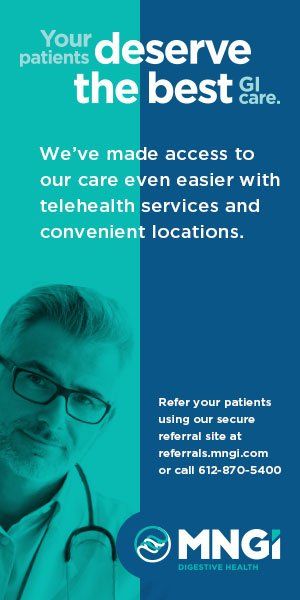Interview
Addressing Disparities and Improving Health
Jeremy Hanson Willis, CEO, Rainbow Health
Please share some background around the 40-year history of Rainbow Health.
Rainbow Health exists to address the health needs of LGBTQ+ and HIV-affected communities across Minnesota. It was founded in 1983 as Minnesota’s first HIV/AIDS organization the Minnesota AIDS Project. Foremost among our goals still today is ending HIV/AIDS in Minnesota. Over time, we’ve broadened our scope beyond HIV to include a wide array of comprehensive services to address the challenges that our LGBTQ+ communities face. Our approach not only sees the whole person and their intersecting identities, but also seeks to address multiple overlapping challenges to better health, such as housing, financial assistance and food support, health insurance, legal issues, peer support, case management, chemical health and mental health. We employ a two-pronged approach that provides direct services and also drives systemic change in health care with research, education and advocacy. Learn more about us at rainbowhealth.org.
Please tell us about the kinds of mental health services that are available through Rainbow Health.
Our research indicates that six of seven LGBTQ+ Minnesotans experienced moderate to severe mental distress in 2022, with 23% experiencing severe mental distress nearly every day. To address this need Rainbow Health provides culturally appropriate behavioral health care of, by, and for the diverse LGBTQ+ and HIV communities we serve. Our care is trauma informed, harm reduction based, and sex positive. Our 15 clinical therapists offer individual, family, and group therapy either in person or via telehealth. Although we take most insurance, we turn no one away for inability to pay. We have a diverse staff who can provide specialized care to the full array of LGBTQ+ people across the state over 14 years old. Our mental health services can also be combined with our other comprehensive support services, such as housing, financial assistance, health insurance, legal advocacy, peer support, case management, and chemical health.
What can you share about some of the research projects Rainbow Health is conducting?
Rainbow Health conducts a variety of community-based research to better understand and draw attention to the heath needs and barriers to better health for LGBTQ+ and HIV-affected communities. Since 2010, we’ve collected information on social determinants of health and individual health outcomes for LGBTQ+ Minnesotans through our Voices of Health survey. This survey information is collected online and in person at community events across the state and is published regularly on our website. Voices of Health explores health challenges ranging from basic health care, mental health, chemical health, violence and safety and shows the negative impact of financial, stigma, discrimination and other barriers to health care that LGBTQ+ Minnesotans face.
49% of the LGBTQ+ people surveyed reported being verbally harassed in a health care setting.
Please tell us about your new Free to Be Program?
With the support of a $2 million grant from the United Health Foundation, Rainbow Health’s Free to Be program connects young adults (age 14-24) in the LGBTQ+ and/or BIPOC communities to mental health care, primary care, legal advocacy, and social supports to address the high rates of suicide, depression and anxiety within our community. We chose the name “Free to Be” to signify our goals about the impact this program aims to achieve. We want to empower and encourage young people to embrace their authentic selves and be free from societal expectations or stereotypes. We want to provide a nonjudgmental and safe space, where young people can explore and discuss their experiences, concerns and emotions freely. We want to reduce the stigma or fears that may come along with seeking mental health care.
How are you addressing the specialized needs of the aging population?
Rainbow Health envisions a community that fully supports its older adults, including LGBTQ+ elders and those aging with HIV, with a range of services, supports and policies that allow them to age with dignity, independence and access to the quality care they seek and deserve. Older adults are the fastest-growing demographic within Minnesota’s LGBTQ+ population. Older LGBTQ+ people too often encounter significant discrimination, gaps in service and profound isolation as they age. From the perspective of those living with HIV, advancements in HIV treatments mean that the HIV infection is no longer the death sentence it typically was in the 20th century, and that most people are now living with HIV into older adulthood. Many not anticipating that aging with HIV would be a possibility did not plan psychologically or financially for their later years and may need services from providers who did not anticipate needing to familiarize themselves with the needs of older clients with HIV. Rainbow Health not only provides activities and resources directly to older adults but also trains and consults with senior care providers to improve the quality of elder care across the state.
Benefits counseling is an important area of your service, what can you share about this?
Our research indicates that nearly one-third of LGBTQ+ Minnesotans do not have health insurance. With 76% of this population reporting incomes less than $75,000, many with below-average wages believe they can’t afford insurance. Others have experienced harassment and mistreatment in health care settings and avoid care altogether. Rainbow Health benefits navigators work with LGBTQ+ people and those living with HIV to better understand, explore and access health insurance – a key component to quality care. Our navigators will help ensure the people get the best plan that works for them. We also train and consult with health insurance companies to improve policies and practices that uniquely affect LGBTQ+ people, especially transgender and gender nonconforming people. Our legal advocacy team helps transgender youth and adults who have been denied gender-affirming care to get the care they need.
What are your plans for expanding your impact on marginalized communities?
As a community-based nonprofit, Rainbow Health relies on the generous support of individual and institutional donors to advance our mission. Although we serve thousands of Minnesotans every year, many of our programs have waiting lists and limited staff. Anyone who would like to donate and help us reach more LGBTQ+ and HIV affected people should visit our website or contact someone from our team at rainbowhealth.org/get-involved. Rainbow Health also partners with health care providers to improve LGBTQ+ patient care. We’ve trained and consulted with large and small clinics, hospitals and treatment centers and welcome more opportunities. Finally, please help spread the word to others about Rainbow Health’s work. Like and follow @RainbowHealthMN on Facebook, Instagram, Threads and LinkedIn, and use #RainbowHealth on social media to show your support and share our content with friends and family.
What are some of the ways physicians can utilize your services as a support for themselves, their patients and their communities?
First, we encourage LGBTQ+ and allied health care providers of all kinds to sign up for Rainbow Health’s Violet Directory, an online directory of providers, services and education. The Violet Directory helps physicians connect with other trained and specialized care providers and helps LGBTQ+ patients find care. Second, we encourage LGBTQ+ and allied physicians to contact Rainbow Health if you (or your employer) could benefit from our training and consulting services that seek to make all care more welcoming and inclusive of LGBTQ+ people – in all their racial, gender and age diversity. To get started, check out our Standards of Inclusion for ideas and suggestions about how you can create better care for your LGBTQ+ patients. Last, for those who are members of the Minnesota Medical Association, Rainbow Health is currently partnering with MMA to build a new LGBTQ+ physician group. To learn more, contact the MMA.
What are the most important things you’ve seen for physicians to keep in mind when they are treating an LGBTQ+ patient?
First, we all need to demand and expect better medical education – including continuing education – on LGBTQ+ health and health for people of color. Many health disparities for these populations are created or exacerbated by ill-informed physicians and medical systems. Second, doctors need to consider that many LGBTQ+ people have experienced traumatizing harassment and mistreatment in health care settings that damage the trust they have in medical professionals. In our Voice of Health research, Rainbow Health found that 49% of the LGBTQ+ people surveyed reported being verbally harassed in a health care setting, 55% had a health care provider refuse them care because they were LGBTQ, and 33% reported needing a doctor in the past year but did seek care out of fear of mistreatment.
Jeremy Hanson Willis, is the chief executive officer for Rainbow Health, a position he has held since 2019.
MORE STORIES IN THIS ISSUE
cover story one
Serious Illness Communication: Building a statewide standard of care
By Lori Brostrom, MBA
cover story two
Radon and Lung Cancer in Minnesota: A bigger problem than you think

















